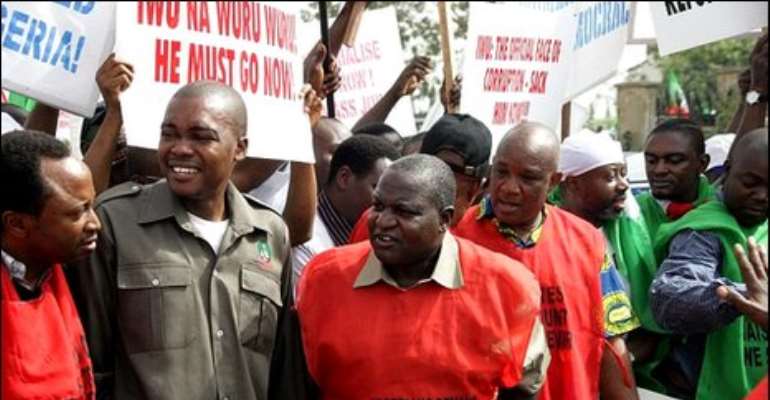IS JONATHAN SERIOUS ABOUT NIGERIA ELECTORAL REFORM?

By Caroline Duffield
Cheeks are still flushed and wine glasses still raised at the dumping of Maurice Iwu, Nigeria's criticised elections chief.
Accused of presiding over five years of massive electoral fraud, he is widely despised.
Elections are barely a year away in this pulsing, oil-rich nation, and Mr Iwu's removal is raising big questions – and big hopes – for democracy.
“Don't replace a dog with a monkey. In the end, both are animals with a tail,” says barrister Chief Emeke Ngigi, quoting a proverb from his village.
“What does it mean? We don't want another Iwu. Nigerians will not stand for it.”
Whoever is the next election chief will carry the hope of a 150 million people, robbed of their votes in every election since the end of military rule in 1999.
Nigerians know Mr Iwu's removal alone is merely a tremor – far from the earthquake of reform many pray for.
Gateway to power
In Nigeria, when the bodies of voters pile up on the campaign trail, you know the election fight is in full swing.
Many think the acting president has a special opportunity to right past wrongs
Political office here is access to massive oil wealth: a gateway to power and patronage.
And so people are familiar with the organised, mass falsification of voting registers; wearily, they shake their heads at ballot boxes, mysteriously stuffed by 0900 hours on polling day.
A new note was struck in March, when acting President Goodluck Jonathan visited the US.
“Elections in Nigeria will, from now onwards, will be free and fair,” he promised.
It is almost a battle-cry.
Shredding the rule-book – a beautiful ambition – would be a strenuous fight.
Stench of corruption
It is a fight Mr Jonathan appears to want.
“He has a special opportunity,” observes Auwal Rafsanjani, Chairman of the Zero Corruption Coalition.
“He has the chance to correct the past. People will throng to him, to support sincerity.”
Goodluck Jonathan appears to be willing to fight for electoral reform
But correcting the sins of the past will not be easy.
At every election, Nigeria's electoral sickness re-appears, in the shape of hungry, barefoot private armies – the “hired political thugs”.
In the pay of wealthy candidates, these youths – almost children – are employed to threaten, harass and intimidate voters.
And beyond the behaviour of power-hungry politicians, real change requires the basics:
safe custody of election materials
rigorous prosecution of electoral offences
judges that rule with integrity on disputed results
impartial security for every voter from police and military
and preventing the all-powerful electoral officers from abusing their positions.
The system reeks of money and corruption, with individuals milking it at every level.
Fork in the road
They are likely to fight to resist change.
The question is: will Mr Jonathan take them on? “The critical point is, we need to know whether Goodluck Jonathan himself is standing,” insists Mr Rafsanjani.
Changing the rules as the umpire – and then competing yourself – destroys your credibility
Political insider
That question at present is unanswered.
Shiny billboards appeared in Abuja last week – “Goodluck is the Positive Hope for Nigeria,” they breathed, raising intense speculation.
The acting president dissociated himself from them.
But, conspicuously, has still not ruled out running.
Some observers believe if he does stand, electoral reform will remain a dream.
They believe the moment he declares his candidacy, the corruption machine – his party bureaucracy, the security services, the election commission – will swing behind him, wanted or not.
They are an unstoppable force.
“Changing the rules as the umpire – and then competing yourself – destroys your credibility,” points out another veteran political insider.
“It erodes credibility as a leader; it erodes the credibility of the changes he is trying to make.”
It seems Mr Jonathan – the quiet man, who was never supposed to be president – stands at a fork in the road.
“He is the wild card. He has a choice,” says Mr Rafsanjani.
“He could run for office. But if he sacrifices that opportunity, he can impose his reforms.
“Then, he will be remembered as a hero, who organised free and fair elections.”
